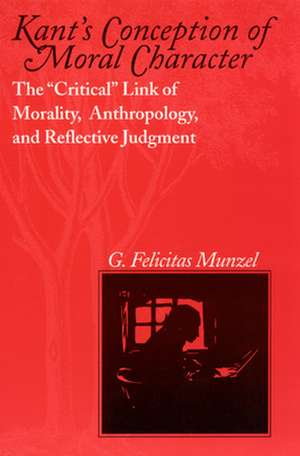Kant's Conception of Moral Character: The "Critical" Link of Morality, Anthropology, and Reflective Judgment
Autor G. Felicitas Munzelen Limba Engleză Hardback – iul 1998
Currently fashionable among critics of enlightenment thought is the charge that Kant's ethics fails to provide an adequate account of character and its formation in moral and political life. G. Felicitas Munzel challenges this reading of Kant's thought, claiming not only that Kant has a very rich notion of moral character, but also that it is a conception of systematic importance for his thought, linking the formal moral with the critical, aesthetic, anthropological, and biological aspects of his philosophy.
The first book to focus on character formation in Kant's moral philosophy, it builds on important recent work on Kant's aesthetics and anthropology, and brings these to bear on moral issues. Munzel traces Kant's multifaceted definition of character through the broad range of his writings, and then explores the structure of character, its actual exercise in the world, and its cultivation.
An outstanding work of original textual analysis and interpretation, Kant's Conception of Moral Character is a major contribution to Kant studies and moral philosophy in general.
The first book to focus on character formation in Kant's moral philosophy, it builds on important recent work on Kant's aesthetics and anthropology, and brings these to bear on moral issues. Munzel traces Kant's multifaceted definition of character through the broad range of his writings, and then explores the structure of character, its actual exercise in the world, and its cultivation.
An outstanding work of original textual analysis and interpretation, Kant's Conception of Moral Character is a major contribution to Kant studies and moral philosophy in general.
Preț: 489.30 lei
Preț vechi: 623.14 lei
-21% Nou
Puncte Express: 734
Preț estimativ în valută:
93.65€ • 96.51$ • 79.06£
93.65€ • 96.51$ • 79.06£
Carte indisponibilă temporar
Doresc să fiu notificat când acest titlu va fi disponibil:
Se trimite...
Preluare comenzi: 021 569.72.76
Specificații
ISBN-13: 9780226551333
ISBN-10: 0226551334
Pagini: 400
Dimensiuni: 152 x 229 x 28 mm
Greutate: 0.71 kg
Ediția:1
Editura: University of Chicago Press
Colecția University of Chicago Press
ISBN-10: 0226551334
Pagini: 400
Dimensiuni: 152 x 229 x 28 mm
Greutate: 0.71 kg
Ediția:1
Editura: University of Chicago Press
Colecția University of Chicago Press
Cuprins
Preface
A Note on Translation
Abbreviations
Introduction
Part One: Development of the Conception of Character and Its Relation to Other Terms and Distinctions of the Critical Philosophy
1. Character Conceived as an Issue of the Conduct of Thought (Denkungsart)
Thematic Overview
Historical Context
From Precritical to Critical Philosophy: The Path to Character as an Issue of Thought
Maxim Adoption and the Moral Comportment of Mind (Gesinnung)
2. Character and the "Unity of the Inner Principle of the Conduct of Life"
Character, Efficacious Cause, and the Intelligible/ Empirical Distinction
Character and the Capacity of Desire
Unity of Two Orders of Necessity
Unity of the Human Aptitudes
Character and the Aesthetic Capacities of Feeling
3. Character and Radical Evil
Status of Moral Evil in Kant's Thought
Human Conflict: Its Forms and Their Root in Character
Virtue: Embattled Moral Comportment of Mind (Gesinnung)
Establishing Character: The Moral Task of Establishing Inner and Outer Peace
Part Two: Human Moral Character: Its Structure and Cultivation
4. Principles of Orientation and the Relational Structure of Character
Human Orientation to the Good By the Dawn of Natural Light
Reflective Principles of Orientation Relating the Human Subject and Reason
Rational Faith
Conscience
Conduct of Thought (Denkungsart) and the Maxims of Sound Understanding
Character and Human Discourse
5. Pedagogy: The Formation (Bildung) of Character
Aims and Nature of Pedagogy in General
Propaedeutic Functions in Relation to Character Development
Character as the Guiding Principle for Pedagogical Theory
Discipline, Cultivation, Formation
Example, Religion, and Internal Discipline
Moral Spiritedness and the Relation of Aesthetic and Moral Cultivation
Moral Education Proper
Moral Discernment: Cultivating a Taste for the Law
Socratic Method: Cultivating the Habit of Moral Judging
Relation of Pedagogical and Communal Roles to
Individual Responsibility for Establishing a Character
Pedagogical Function of the Republican Constitution
The Virtue That Cannot Be Taught
Epilogue: Character as a Grafted Entity
Bibliography
Index
A Note on Translation
Abbreviations
Introduction
Part One: Development of the Conception of Character and Its Relation to Other Terms and Distinctions of the Critical Philosophy
1. Character Conceived as an Issue of the Conduct of Thought (Denkungsart)
Thematic Overview
Historical Context
From Precritical to Critical Philosophy: The Path to Character as an Issue of Thought
Maxim Adoption and the Moral Comportment of Mind (Gesinnung)
2. Character and the "Unity of the Inner Principle of the Conduct of Life"
Character, Efficacious Cause, and the Intelligible/ Empirical Distinction
Character and the Capacity of Desire
Unity of Two Orders of Necessity
Unity of the Human Aptitudes
Character and the Aesthetic Capacities of Feeling
3. Character and Radical Evil
Status of Moral Evil in Kant's Thought
Human Conflict: Its Forms and Their Root in Character
Virtue: Embattled Moral Comportment of Mind (Gesinnung)
Establishing Character: The Moral Task of Establishing Inner and Outer Peace
Part Two: Human Moral Character: Its Structure and Cultivation
4. Principles of Orientation and the Relational Structure of Character
Human Orientation to the Good By the Dawn of Natural Light
Reflective Principles of Orientation Relating the Human Subject and Reason
Rational Faith
Conscience
Conduct of Thought (Denkungsart) and the Maxims of Sound Understanding
Character and Human Discourse
5. Pedagogy: The Formation (Bildung) of Character
Aims and Nature of Pedagogy in General
Propaedeutic Functions in Relation to Character Development
Character as the Guiding Principle for Pedagogical Theory
Discipline, Cultivation, Formation
Example, Religion, and Internal Discipline
Moral Spiritedness and the Relation of Aesthetic and Moral Cultivation
Moral Education Proper
Moral Discernment: Cultivating a Taste for the Law
Socratic Method: Cultivating the Habit of Moral Judging
Relation of Pedagogical and Communal Roles to
Individual Responsibility for Establishing a Character
Pedagogical Function of the Republican Constitution
The Virtue That Cannot Be Taught
Epilogue: Character as a Grafted Entity
Bibliography
Index
